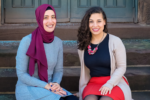Writing for MMW, I often get tired of seeing images, over and over, of Muslim women as oppressed, helpless, and passive. It’s always a nice change to see pieces in the media that demonstrate alternate representations, even when these can come with their own problems. Two recent articles about Muslim women working as activists and community leaders illustrate two very different ways of writing about active Muslim women.
The first article, Muslim in NYC: Muslim Women Defy Stereotypes With Activism, focuses on various Muslim women in the New York City area who are engaged in anti-war activism or programs supporting women in their community, with a focus on the activists themselves. The second, Needy Women Get Holiday Shopping Day, talks about a special shopping day for low-income women, run by the International League of Muslim Women (ILMW). The focus of this article is on the women who use the service, and very little is said about (or by) the women who planned the event.

Members of Desis Rising Up and Moving (DRUM), an organization in New York City that advocates for South Asian immigrants. Via the NY1 website.
In the first article, Muslim women are shown as very strong and active in diverse settings, and the article even acknowledges a diversity of opinions and experiences among Muslim women. The focus is on the Muslim women who are leaders within the movements and organizations profiled. As the article’s headline suggests, the women depicted in this article are nothing like the popular stereotype of Muslim women as quiet and downtrodden.
And yet, the headline, “Muslim Women Defy Stereotypes,” bothered me too. It implies that nothing that Muslim women do can be explained or understood apart from the stereotypes that predefine us; Muslim women are either confirming or breaking stereotypes, but there is no space just to act. The emphasis on “Hey, look, Muslim women are doing something that you wouldn’t expect!” overlooks the fact that if there are so many women breaking these stereotypes, maybe the article needs to look instead at why the stereotype is there in the first place, or why people would believe it when reality is far more complex. Women who don’t get involved in their communities are also described with relation to this stereotype:
While these women have become very vocal about political and social issues, many others still remain quiet in the background. Some activists say that is because they still live in a male-dominated culture.
This may be true for many women. However, there are a lot of reasons for people to just not want to be involved. Many non-Muslim women also aren’t involved in their communities, and aren’t assumed to be quiet simply because their male-dominate culture won’t let them (and let’s face it, how many women actually live in a culture that isn’t male-dominated?) Again, Muslim women can only be understood in relation to the dominant perception of what their lives are like. Although the article brings many positive things, the focus on how different these active Muslim women are from the stereotype, without a parallel focus on why the stereotype is problematic in the first place, doesn’t do much to disrupt the ways that many elements of mainstream North American society portrays Muslim women.
In many ways, the second article has the opposite problem. The International League of Muslim Women is mentioned as the organization hosting the event, but the only information about it is a very short and technical description of its history and other activities, and the only quote from an ILMW representative is about the timing of the event. On one hand, it’s nice to see an article that doesn’t make Muslim-ness the central element of the story, or have a tone of “Wow, Muslim women actively doing something, OMG, I never would have expected that!” On the other hand, there’s so little there about Muslim women that it would be easy to miss their involvement in the story entirely. (This is, however, a somewhat selfish complaint; the story was clearly not meant to be about Muslim women, and although it always makes me happy to see positive portrayals of Muslimahs, I do totally understand that the story’s emphasis was elsewhere, which is totally fine. That said, I wish they had used a word other than “needy” to describe the women participating in the shopping day.)
So, if the first article is overdoing the surprise factor of Muslim women taking leadership roles, and the second article is understating it, am I being too picky? Would it be impossible for them to “get it right?” Maybe. But I think the point is that it’s not just about complaining. It’s important to understand the effects of all media coverage, and this goes way beyond understanding the effects as simply “good” or “bad,” but to understand what the implications are of any particular media angle. The best that we can hope for is probably to see a good variety of articles (and other forms of media coverage) that represent diverse experiences, tell stories in diverse ways, and fill in the gaps where other stories are lacking.


